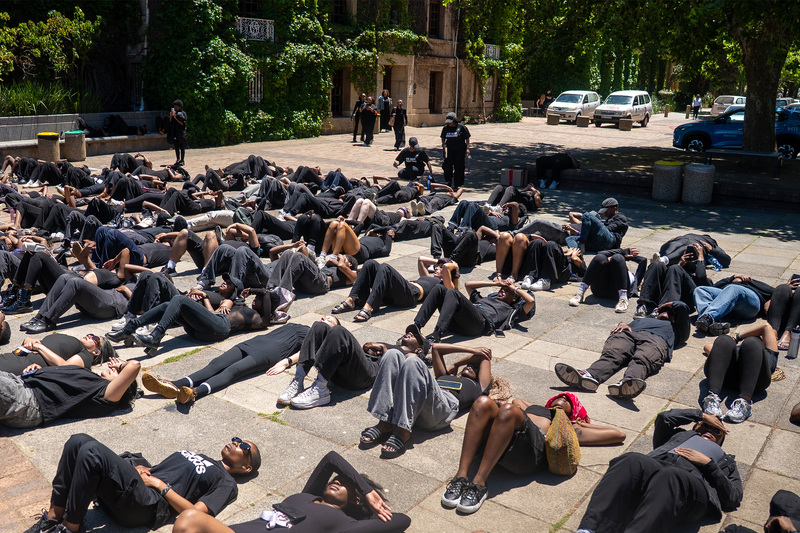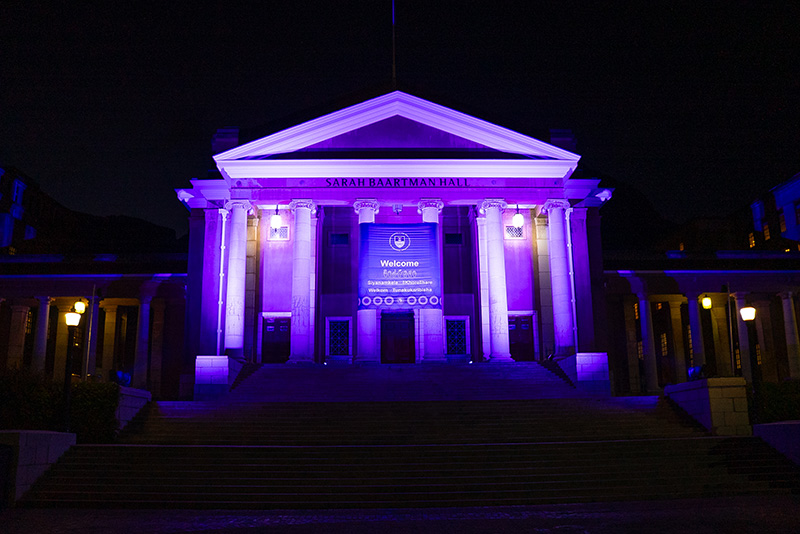‘Stay strong in the fight’
24 November 2025 | Story Kamva Somdyala. Photos Boikhutso Ntsoko and Ruairi Abrahams. Read time 4 min.
The swooshing trees were the only sound that carried across the Plaza as the University of Cape Town (UCT) observed the national 15-minute silent Lie Down on 21 November. Outside the Sarah Baartman Hall, and with the sun shining brightly, students and staff paused and reflected.
The reflection is drawn from a pursuit of ending what is now classified a national disaster: sexual and gender-based violence (SGBV). Women For Change drove the idea for the day, and South Africans duly obliged. The classification directs organs of state to fully implement contingency measures to ensure government manages the crisis effectively. This comes just before the 16 days of activism campaign, observed annualy from 25 November until 10 December.
At UCT, measures to address the SGBV pandemic include a special tribunal that has been established to expedite cases. Part of this process is to ensure that protective measures are in place (including issuing provisional no-contact orders and suspension orders) where allegations warrant this level of action. The university’s strategy is actioned via the deputy vice-chancellor (DVC) for Transformation, Student Affairs and Social Responsiveness’s Goal 5 for holistic SGBV prevention, response and impactful actions that protect the dignity of UCT staff, students and the broader community.

On the day, speaker after speaker spoke about the growing trend of women and children – the most vulnerable – being unsafe in both public and private spaces. They decried the fact that preceding protests on the very issue haven’t moved the needle by way of policy change impact. On the day, silence and space were held for survivors and many who have been lost to us.
In the lead up, many people changed their social media profile images to purple, in answering the call, and Sarah Baartman Hall was illuminated in purple on the evenings of 20 and 21 November. The university also temporarily changed colours of its web and social media sites to purple.
Zero tolerance
The responsibility to run UCT’s programme on 21 November was handed over to the recently constituted Students’ Representative Council (SRC). Kwande Bam, the leader of the SRC, said: “We’ve called for improvements in our GBV policy, calling for things like a manual to be developed so that every student and staff member knows exactly how to deal with cases. We believe in the survivor-centred approach. We must deal with cases as they arise, but what’s equally important is ensuring that they do not happen in future.
“The big message now to students is to carry the activism in our communities as we go back home: stay strong in the fight,” he said.
“I am asking the university to do more to keep us safe. This was a good start.”
Another familiar face on the day was Varsity Cup-winning Ikey Tigers captain, Siphumezo Dyonase, who rallied for a breaking of the cycle of silence. “We want change. We want transformation in legislation, and greater accountability. Survivors need safe spaces because it is something that is all over our country. The main point is that there should be zero tolerance for perpetrators of GBV.”
Friends Marguerite Ruttmann and Andreia De Sousa were also at the silent lie down: “As soon as we heard about it, we knew we had to be here. It is something that affects our family and friends. It’s a very scary phenomena, and for me, I just want my friends to take notice,” said Ruttmann.
“Being afraid all the time is so tiring. This violence has been normalised.”
“The student body really showed up today,” said De Sousa. “I have felt unsafe on campus before and that’s to do with people who treat women badly being around us and sometimes their behaviour is excused,” she said. “Therefore, I am asking the university to do more to keep us safe. This was a good start.”
Another student Vlad Cassidy weighed in: “One approach to making men more aware to these issues is to show them that misogyny and toxic masculinity can bite them back badly. If showing them the terror women live under is not enough to get their act right, maybe this is a good way to show them that it’s bad for them as well. Think of the notion that men should not show emotion – stoicism. It has an effect down the line with issues of mental health, for example.”
 This work is licensed under a Creative Commons Attribution-NoDerivatives 4.0 International License.
This work is licensed under a Creative Commons Attribution-NoDerivatives 4.0 International License.
Please view the republishing articles page for more information.















